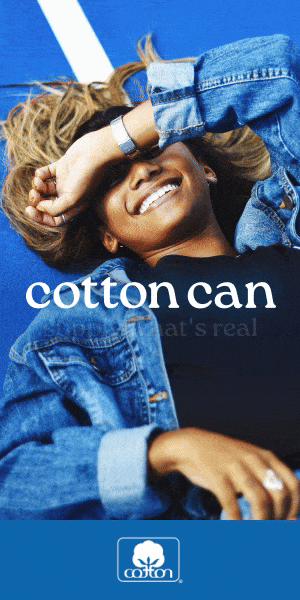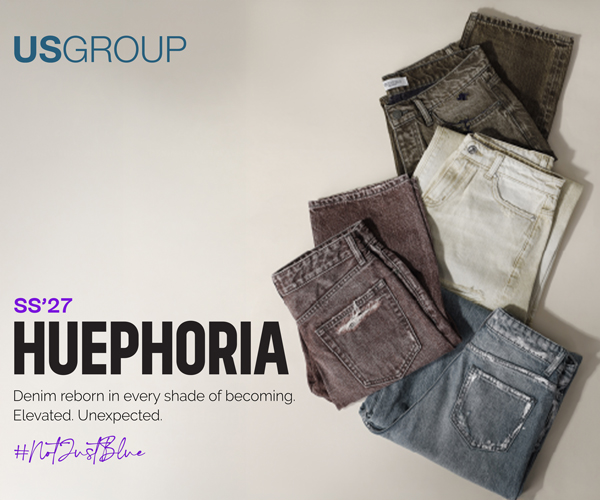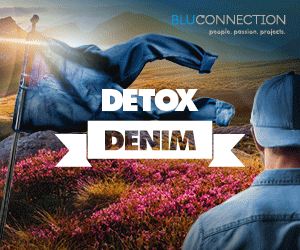Blending chemistry and curiosity

Wojciech Beyger, senior quality manager for 7 For All Mankind, has travelled the world as a standards and laundry specialist, creating new recipes, monitoring back-end processes and passing on his extensive knowledge to those he oversees.
Q What do you like most about your job?
A I like that I can use my chemist nature. Even as a child, I loved experimenting – I remember my mother being upset when I burned a hole in the carpet with chemicals! In this job, you can develop yourself by continually experimenting. I’m Polish but my family name is German and I think I have a somewhat German nature: I like innovations but everything has to be methodical and well organised. In this job, every day is different – you never know what it will bring!
I also like working with people. My parents taught me to respect everybody throughout the company, from the cleaners to the CEO. I apply this approach everywhere I go, even in places that might not be used to it. From the beginning, I always wanted to help and educate. When you manage and train lots of people, you end up forming close bonds and many former colleagues are still in contact.
I like to change my environment. I really enjoyed my time in Mauritius – it is a very mixed and multicultural place – some of the workers from Bangladesh and Madagascar wouldn’t see their families for months or even years. When I organised daily production meetings, staff would share personal stories, thoughts and opinions. In these sorts of environments, you cannot separate your job from your personality; in some ways you feel like a leader and a boss, a technical guide, but in other ways you feel like a father figure, especially for the younger workers. You teach not only the job principles but also life principles and life philosophy, in a way.
What does it take to be a good denim technician?
I have produced and developed thousands of recipes. I believe to do this well you need to have both education and experience. Unfortunately, many people just rely on experience and they don’t have the basic background knowledge. I tend to hire technical people who have the correct education so they have a scientific and engineering understanding of what they are doing and what they are seeing as an outcome.
How do you create great recipes?
We need to understand not only what is happening but why. This is my principle. When I was working at VF, I bought raw materials like enzymes and blended them to be used in the laundry; we also developed our own softener formulas with high anti-yellowing features and extremely good softness. The knowledge and recipes need to be registered, shared and followed up, using the correct software, databases and archives. These practical solutions, clear and simple recipe registration with cost analysis, was always important for me.
I favour a very professional way of testing and comparing products, not just 1kg versus 1kg but also in terms of money; comparing the costs of various products and the outcomes. I also developed my own products, such as anti-backstaining agents. Whenever I moved companies, I brought that knowledge, and people appreciated that they were getting support.
How do you integrate ‘sustainable’ products into the workplace?
The word sustainability can be overused, maybe some people don’t understand it deeply enough. For instance, when bleaching with hypochlorite, if you process it properly and correctly neutralise, you only end up with salt, water and oxygen. Another example: some of the chemicals that tried to replace permanganate in spray ended up being more harmful for workers. We also suffered tensile problems on those garments, even though the chemicals were advertised as “green”.
In about 2000, a benzoyl peroxide was developed as an “eco” bleaching product, but it could be more harmful, and also created the risk of explosions if handled incorrectly. There’s a similar story for pumice stones replacements, including trials to use thick synthetic rope knots, or synthetic stones. We need to select wisely, understanding the origin of the material: does it create microplastic pollution? Is it really less harmful to the planet? I am not against these tests but emphasise the need for non-emotional and non-political research first.
Even ozone can become harmful for operators, if it’s not handled correctly or the machine is not securely deactivated and the ozone disposed of. Maintenance is not always the strongest point in some countries. Laser is a really good tool but it consumes quite a lot of energy, and you need to have good exhaust ventilation because otherwise the fumes could harm the operators. So, in some cases, traditional scraping can be less harmful, especially if using pneumatic scraping tools.
There have been various trials over the years to replace old methods – touted as ‘unsustainable’ – with new ones that sometimes turned out to be riskier in other aspects. It reminds me of the saying, “Only the dose makes the poison”.
My point is that sustainability in chemistry is not as simple as replacing the chemicals, but a wise combination of new and old methods, correct utilisation and correct safety rules and protection. Always ask yourself questions before you introduce solutions. This way, you work in a way that doesn’t harm anybody – the final consumer, your workers and the environment. This, for me, is sustainability.
How does your knowledge of machinery help?
In the past, chemicals and machinery were considered as separate business areas. Today, we should understand the symbiosis of both. There are many products that need to have the correct equipment to work properly and efficiently. Innovative chemical companies, such as Nearchimica and Soko, cooperate closely with machinery companies; they develop products that require certain equipment to give the full benefits. Soko’s Stardust and Lumia processes, or alternatively Nearchimica’s Nearstone Zero and Nearbooster Fade, in combination with ozone and nebulisation by Tonello’s Core system are good examples of this. Another good example can be low temperature biopolishing or enzymatic abrasion treatment in the nearly waterless Core machine.
I remember the days when suppliers visited with bottles of chemicals and asked us to try them. Then they started to bring some garments, showing the effects of their chemicals. Nowadays, really good companies offer a professional service lab – like a small advanced professional laundry with the latest lasers and advanced washing machines (core, jet, ozone) – so we can test and develop new finishes together.
Garmon, Nearchimica and CHT were some of the first to invite their clients for sample processing. I have visited various chemical companies recently and have been impressed with the equipment and professionalism. I am also a fan of the latest Tonello innovations and Jeanologia laser developments. I know they are competitors but both are simply the best in their areas.
For those that work in the laundries, it's important to understand both the chemicals and the machinery, and always work with an open approach. And do not forget the human factor. I used to talk to Bangladeshi operators who couldn’t read or write, but they were able to explain what was happening and we learnt from each other.
What are the priorities in the laundries?
One of my best bosses, Marc Belon at VF, used to laugh and say, “People in the laundry answer everything with ‘It depends’.” And, here I answer as well … it depends. The priorities depend on where you are based and what type of products you are producing. Some brands produce garments in countries with water scarcity issues, for instance close to Dubai, so using methods with reduced water is important there. In Mauritius, we focused on water usage and avoiding pollution in general. In other countries, the priority might be the cost. But it should always be a balance.
In terms of my priorities, the first is people: the safety of the workers and the final consumer. This is crucial for me, as I have seen examples – either with my own eyes or when people have told me – of workers suffering. Second, we need to work in a way that is safe for water, the atmosphere and the Earth in general, in terms of pollution. My third priority is energy consumption – I might not be creating pollution where we produce directly, but if I use a product or machinery that requires a lot of electricity, I’m creating pollution somewhere else.
What are you most proud of?
I know I have been able to produce consistently good garments with extremely difficult washes, using marble methods, special jet dyeing, rags or stones alternatives. I could be proud that I know these recipes, but I’m prouder of the people I’ve trained to have the same philosophy of managing people, treating their co-workers and team building as I do: organised and precise, focusing on details.
For example, in Mauritius a young man was hired almost directly from Monash University and I taught him this job from zero. By the time I left, he was able to run the dry and wet processing plant section, working with brands like Armani, Diesel and Guess. There’s a similar story with a very skilled young Mauritian lady. I could give more examples from Turkey, Malta, Tunisia and Poland. Every case is a separate story, a piece of my life. This is satisfaction for me – many people who were my “students”, I can now call my friends. We support each other, no matter what companies we work for. I know I can count on them and they can count on me. This I am proud of.
What did you see at ITMA that caught your eye?
I was impressed with Soko’s Lumia and Stardust, which create abrasion and bleaching looks almost without water. They use a technique that has been around a long time but they have developed it in a new way. Another revolutionary product is N-ICE of Nearchimica – reactive dye by nebulisation (Core System), without salt and without heating, with only drops of water. This is real sustainability; no pollutants, clean effluent. Here you really see how important the harmony of the right machinery and the right products is.
This drive to have the right synergy between chemicals and equipment at ITMA impressed me. I also visited Tonello and Jeanologia, who I’ve had the pleasure of working with. Let me say again: in this industry, people are very important; people who are striving to do things well and who work in an ethical way. I am happy the company I work for now has this philosophy, too: working with correct fabrics, vendors, product developments, designs and high-quality requirements.
Polish national Wojciech Beyger is a chemist by nature: he graduated as a chemical engineer and applies his analytical mind to help designers produce beautiful effects and sustainably washed garments. His job roles have taken him all over the world, including 16 years at VF, where he managed laundry and R&D labs in Poland, Malta and Turkey, among others. He worked as a consultant before moving to Mauritius to manage departments for REAL Garments and Denim De l'ile (DDI), where he oversaw 300 staff. He is currently a senior quality manager for 7 for All Mankind, working across various locations to monitor quality requirements and ensure all processes conform to strict standards. He is based in Switzerland and has three children.
Photo: Wojciech Beyger












